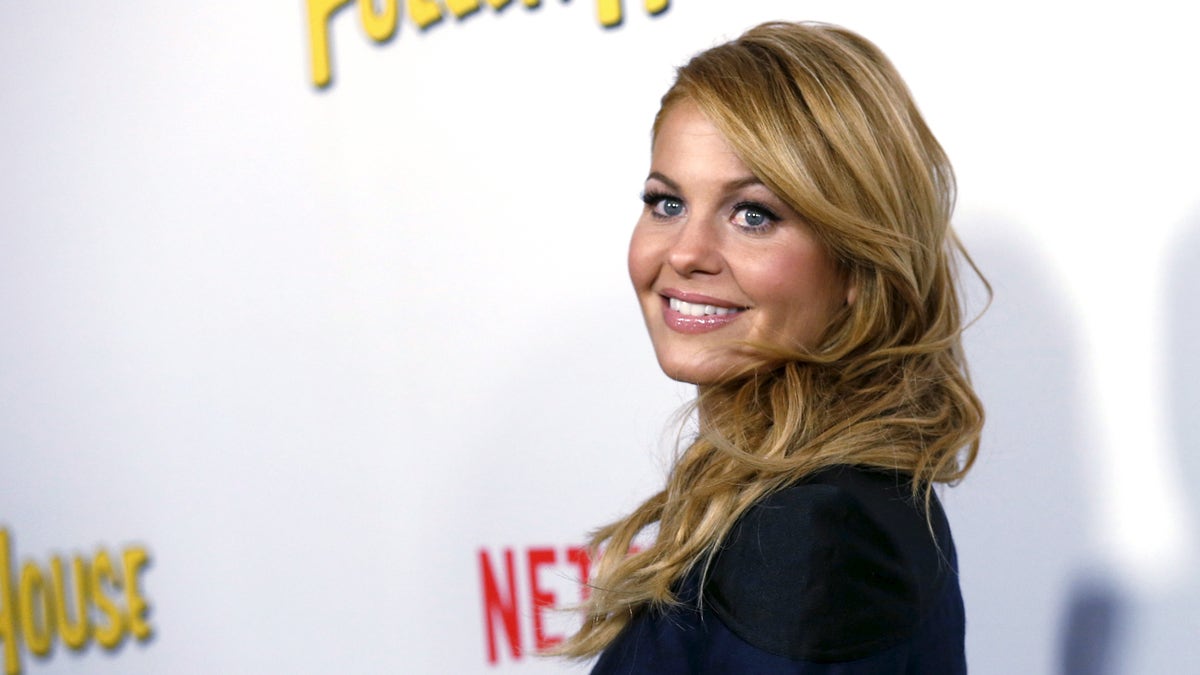
Cast member Candace Cameron Bure poses at the premiere for the Netflix television series "Fuller House" at The Grove in Los Angeles, California February 16, 2016. (REUTERS/Mario Anzuoni)
"Fuller House” star and co-host of “The View” Candace Cameron Bure has spoken out in recent years about her struggle with bulimia, and she’s not stopping now. The mother of three sat on a panel Tuesday in New York City for Eating Recovery Day, hosted by the Eating Recovery Center, to discuss the pervasiveness of eating disorders and continue the conversation about their dangers.
After the event, the 40-year-old actress spoke with FoxNews.com about how and why she is continuing to share her experience despite facing criticism from some viewers of her shows.
“I’m thrilled to be part of this campaign because I do have personal experience and a personal story,” Bure told FoxNews.com. “Thirty million Americans are affected by eating disorders, and there are many stigmas attached to them that people are unaware of or uneducated about.”
The actress, who plays big sister D.J. Tanner on “Fuller House” and its predecessor, “Full House,” has spoken at length about her struggle with and recovery from bulimia in three published books— most notably in her first, “Reshaping It All: Motivation for Physical and Spiritual Fitness,” released in 2011. She developed bulimia when “Full House” ended in 1995 after which she made an emotionally tumultuous move to Canada with her husband, Russian-born NHL player Valeri Bure. Turning to her faith eventually helped her overcome the disease.
Despite her outspokenness about bulimia, Bure has faced backlash from some fans for how she has broached the topic of eating disorders at certain points in her career.
In a November 2015 episode of “The View,” some of Bure’s co-hosts addressed presidential candidate Donald Trump’s comments on losing 15 pounds on the campaign trail, when the conversation turned to eating disorders.
"We were just discussing whether it's better to be anorexic or bulimic backstage," co-host Joy Behar said in the episode.
Co-host Michelle Collins said she’d prefer bulimia to “get to enjoy the meal.”
At the time, Bure pointed out that the conversation was in jest, adding, “as someone that has dealt with an eating disorder, I don’t want to make light of anyone that has it.”
She readdressed the controversial comments with FoxNews.com and said humor can be an appropriate or inappropriate way to discuss sensitive topics, but “it depends on the way the humor is being used.”
“Having the conversation at all is something that should be celebrated because I think that’s one of the things that is so difficult— that people are not aware of eating disorders.”
“Fuller House” has also faced criticism from some people who argue the so-called family show contains themes that are too racy and may have a negative influence on girls.
Research shows media and pop culture can impact the pressure on young women to achieve and maintain a body type that may not be realistic or healthy for everyone.
Bure said she doesn’t feel the show has hyper-sexualized women or that it’s relatively any less appropriate than “Full House” was back in the ‘80s and ’90s, but she encouraged parents to screen what their children watch, no matter the content, to ensure it aligns with their family’s values.
When it comes to parenting her own children— Natasha Valerievna Bure, 17; Lev Valerievich Bure, 16; and Maksim Valerievich Bure, 14— some of the values she has promoted stem directly from her personal experience.
“My husband and I have always been encouraging of our kids having a healthy lifestyle and putting healthy foods in your body,” Bure said, “but realizing everything is permissible, but the stuff that isn’t good for you, you have to eat in moderation.”
For Bure, emotional issues were the primary source of sickness, but she said she believes a media culture that idealizes a certain body type can contribute to some individuals’ eating disorders.
“I think that we look at images all day long, so people can certainly be affected by them,” Bure said. “That’s why it’s so important that we bring awareness to [eating disorders] and know that recovery is possible. I love sharing the message that we were all uniquely created, and not all of us is the same, and that’s something to be celebrated.”
Ultimately, that’s exactly what she and her husband have tried to instill in their children: “to embrace your body type and your shape, and own it, and love it, and be confident.”
